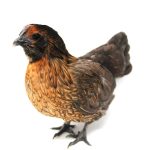Urban chicken keeping has gained popularity in recent years due to its numerous benefits for both chickens and their caretakers. One primary advantage is the production of fresh, organic eggs at home, promoting self-sufficiency and sustainability. Chickens also serve as natural pest control agents, consuming insects and reducing the need for chemical pesticides in urban environments.
Keeping chickens provides educational opportunities for children and adults, offering insights into animal husbandry, biology, and responsible pet ownership. These birds are known for their calming effects, potentially contributing to stress relief and improved mental well-being. Additionally, chickens can be a source of entertainment due to their unique personalities and behaviors.
Urban chicken keeping fosters a connection to nature and food production processes, allowing city dwellers to experience a more sustainable lifestyle. This practice can contribute to a healthier, more diverse urban ecosystem while providing fresh, locally-sourced food. As interest in urban agriculture grows, keeping chickens in cities continues to offer multiple benefits for individuals and communities alike.
Table of Contents
- 1 Choosing the Right Breeds for Urban Living
- 2 Creating a Safe and Comfortable Coop in a Small Space
- 3 Feeding and Caring for Urban Chickens
- 4 Dealing with City Regulations and Zoning Laws
- 5 Health and Safety Considerations for Urban Chicken Keeping
- 6 Building a Community Around Urban Chicken Keeping
- 7 FAQs
- 7.1 What are the benefits of keeping chickens in the city?
- 7.2 Are there any regulations or restrictions for keeping chickens in the city?
- 7.3 What are some important considerations for keeping chickens in the city?
- 7.4 What are some common challenges of keeping chickens in the city?
- 7.5 What are some tips for keeping chickens in the city?
Key Takeaways
- Keeping chickens in the city provides a sustainable source of fresh eggs, natural pest control, and a connection to nature.
- Urban chicken keepers should choose breeds that are quiet, adaptable, and have a friendly disposition.
- Creating a safe and comfortable coop in a small space involves proper ventilation, predator-proofing, and adequate space for roosting and nesting.
- Feeding and caring for urban chickens requires a balanced diet, access to fresh water, and regular health check-ups.
- Dealing with city regulations and zoning laws involves obtaining permits, following noise ordinances, and ensuring proper waste management.
- Health and safety considerations for urban chicken keeping include disease prevention, parasite control, and proper handling to minimize the risk of injury.
- Building a community around urban chicken keeping can involve sharing resources, knowledge, and experiences with other urban chicken enthusiasts.
Choosing the Right Breeds for Urban Living
Size Matters
In general, smaller breeds tend to be more suitable for urban environments, as they require less space and are less likely to cause disturbances to neighbors.
Noise Level Considerations
Bantam breeds, such as Silkies or Dutch bantams, are popular choices for urban chicken keeping due to their small size and gentle nature. Another important consideration is noise level. Some chicken breeds are known for being particularly noisy, which can be a concern in close quarters with neighbors. Quieter breeds, such as Australorps or Orpingtons, may be more appropriate for urban settings.
Climate and Weather Conditions
Additionally, it’s important to consider the climate and weather conditions in your area when choosing chicken breeds. Some breeds are more cold-hardy or heat-tolerant than others, so it’s important to select breeds that will thrive in your specific environment.
Creating a Safe and Comfortable Coop in a Small Space

In urban environments, space is often at a premium, so it’s important to create a safe and comfortable coop for your chickens in a small area. When designing a coop for urban chicken keeping, it’s essential to prioritize safety and security to protect the chickens from predators and other potential hazards. This may involve using sturdy materials, such as hardware cloth, to construct the coop and run, as well as implementing secure latches and locks on doors and windows.
Additionally, providing adequate ventilation and insulation is crucial for maintaining a healthy and comfortable environment for the chickens. Proper ventilation helps regulate temperature and humidity levels inside the coop, while insulation can help keep the chickens warm in cold weather. It’s also important to consider the layout and design of the coop to maximize space efficiency and provide ample room for the chickens to move around and roost comfortably.
Utilizing vertical space with roosting bars and nesting boxes can help make the most of limited space in urban settings.
Feeding and Caring for Urban Chickens
Feeding and caring for urban chickens requires careful attention to their dietary needs and overall well-being. Providing a balanced diet is essential for keeping chickens healthy and productive, so it’s important to offer a variety of high-quality feed, supplemented with fresh fruits, vegetables, and occasional treats. Additionally, access to clean water at all times is crucial for maintaining hydration and overall health.
Regular health checks and preventative care are also important aspects of caring for urban chickens. This may involve monitoring their behavior and appearance for signs of illness or distress, as well as providing routine vaccinations and parasite control as recommended by a veterinarian. It’s also important to keep the coop clean and well-maintained to prevent disease and maintain a healthy living environment for the chickens.
Dealing with City Regulations and Zoning Laws
Before embarking on urban chicken keeping, it’s essential to familiarize yourself with city regulations and zoning laws that may impact your ability to keep chickens on your property. Many cities have specific ordinances governing the keeping of livestock within city limits, including regulations related to coop size, setback requirements, noise restrictions, and the number of chickens allowed per property. It’s important to research and understand these regulations before getting chickens to ensure compliance with local laws and avoid potential fines or legal issues.
In some cases, obtaining permits or variances may be necessary to keep chickens legally in urban areas. Additionally, it’s important to consider the perspectives of neighbors and community members when keeping chickens in the city, as their support can be valuable in navigating regulatory challenges.
Health and Safety Considerations for Urban Chicken Keeping

Preventing Disease Transmission
Implementing biosecurity practices is crucial to minimize the risk of disease transmission between chickens and other animals. Regular cleaning and disinfection of the coop and equipment are essential to prevent the spread of diseases.
Protecting Against Predators
Urban environments pose unique threats to chicken safety, including raccoons, rats, and neighborhood dogs. It is essential to take measures to protect chickens from these predators to prevent harm.
Securing the Coop
Securing the coop with predator-proof fencing, locks, and other deterrents can help minimize the risks posed by predators and keep chickens safe from harm. By taking these proactive measures, urban chicken keepers can ensure the health and safety of their flock.
Building a Community Around Urban Chicken Keeping
Urban chicken keeping has the potential to build community connections and foster a sense of shared responsibility for animal welfare and sustainable living. Engaging with neighbors and local organizations can help create a network of support for urban chicken keepers, providing opportunities for knowledge sharing, collaboration on coop building or maintenance projects, and advocacy for policies that support urban agriculture. Community events such as chicken coop tours or educational workshops can also help raise awareness about urban chicken keeping and its benefits, while fostering connections among like-minded individuals.
By building a community around urban chicken keeping, individuals can work together to address common challenges, advocate for supportive policies, and promote responsible chicken keeping practices that benefit both humans and animals alike. In conclusion, keeping chickens in the city offers numerous benefits for both humans and chickens alike. From providing fresh eggs to pest control to educational opportunities, urban chicken keeping has the potential to enhance quality of life while fostering connections with nature and community.
By carefully selecting appropriate breeds, creating safe coops, providing proper care, navigating regulations, prioritizing health and safety, and building community connections, urban chicken keepers can create thriving environments for their feathered friends while contributing to a more sustainable and interconnected urban landscape.
If you’re considering keeping chickens in the city, you may also be interested in learning about how to insulate a chicken coop to keep your feathered friends comfortable in all seasons. Check out this helpful article on how to insulate a chicken coop for tips and tricks on creating a cozy and safe environment for your urban flock.
FAQs
What are the benefits of keeping chickens in the city?
Keeping chickens in the city can provide a sustainable source of fresh eggs, natural pest control, and organic fertilizer for urban gardens. It also promotes self-sufficiency and a connection to where food comes from.
Are there any regulations or restrictions for keeping chickens in the city?
Many cities have regulations regarding the keeping of chickens, including limits on the number of chickens allowed, coop requirements, and distance from neighboring properties. It is important to check with local authorities before keeping chickens in the city.
What are some important considerations for keeping chickens in the city?
Some important considerations for keeping chickens in the city include providing adequate space for the chickens to roam, ensuring proper waste management, and being mindful of noise and odor for neighbors. Additionally, it is important to consider the time and effort required for daily care and maintenance of the chickens.
What are some common challenges of keeping chickens in the city?
Common challenges of keeping chickens in the city include potential conflicts with neighbors, predators, and limited space for the chickens to roam. Additionally, city environments may have more pollution and noise, which can impact the health and well-being of the chickens.
What are some tips for keeping chickens in the city?
Some tips for keeping chickens in the city include researching and understanding local regulations, providing a secure and predator-proof coop and run, and regularly cleaning and maintaining the chicken living space. It is also important to provide a balanced diet, access to fresh water, and regular health check-ups for the chickens.
Meet Walter, the feathered-friend fanatic of Florida! Nestled in the sunshine state, Walter struts through life with his feathered companions, clucking his way to happiness. With a coop that’s fancier than a five-star hotel, he’s the Don Juan of the chicken world. When he’s not teaching his hens to do the cha-cha, you’ll find him in a heated debate with his prized rooster, Sir Clucks-a-Lot. Walter’s poultry passion is no yolk; he’s the sunny-side-up guy you never knew you needed in your flock of friends!







